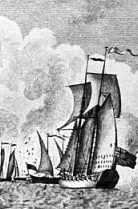
“More adventurer than soldier, Burnham found himself in the thick of some of the grittiest wars of the late 19th and early 20th centuries.”

FREDERICK RUSSELL BURNHAM (1861-1947) spent his life moving from frontier to frontier in search of excitement and fortune. He found both.
More adventurer than soldier, Burnham lived through some of the grittiest wars of the late 19th and early 20th centuries. He first served as a scout during the Apache Wars in the Territory of Arizona. Later while in newly-colonized Rhodesia, he gained notoriety as a scout during the Matabele Wars. During the Second Boer War, he was made chief of scouts for the British army. While in Sonora, he became embroiled in the Mexican Revolution.
Burnham spent the time in between his various campaigns exploring remote regions in west, east, and central Africa and even panning for gold in the Klondike. His friend, the adventure novelist H. Rider Haggard (King Solomon’s Mines, She), once remarked of Burnham, “In real life he is more interesting than any of my heroes of romance.”
Burnham was born on the Minnesota frontier in 1861. At age 15 months, he survived the Dakota War when his mother hid him in a green corn shock just before rampaging Sioux burned down the family homestead. After the family moved to California and his father died, his mother went back east, but young Burnham, then 12, stayed in California and became a rider for Western Union and a hunter for muleskinners at remote stations. He also began learning the craft and discipline of scouting by apprenticing to old frontiersmen and by studying the Apaches, whom he considered the paragons of scout-craft.
In his teens and early twenties, he was swept into the Tonto Basin Feud (a deadly range war), spent time in Tombstone, and also got his first taste of military scouting against the Apaches. He prospected, got married and became a father.

By 1893, his sense of claustrophobia over the closing of the Western frontier and his revulsion with the inequities of the Gilded Age prompted him to pack up and leave America. He took his family to Cecil Rhodes’s frontier colony in southern Africa. Just as the Burnhams reached their new home, the First Matabele War broke out. True to form, he volunteered as a scout. Burnham was one of three survivors of the Shangani Patrol, an episode as resonant in the history of Rhodesia (now Zimbabwe) as the Alamo and Little Big Horn are in the U.S.

During the Second Matabele War, Burnham met Robert Baden-Powell and became one of the inspirations for Baden-Powell’s creation, the Boy Scouts. While fighting in the conflict, Burnham assassinated a native priest whom the British commander and the settlers believed was guiding the insurrection. The incident made him famous, yet it remains controversial to this day.
The Boer War began while Burnham was in Alaska seeking his fortune as a gold prospector. After the early disasters suffered by the British, the commander in chief, Frederick Lord Roberts, cabled Burnham and asked the American to become his chief of scouts, a highly unusual offer. Burnham completed more than 100 operations behind enemy lines. On his last mission, despite severe injuries, he blew up a railroad twice, eluded Boer patrols, and crawled back to the British lines. These daring heroics earned him the rank of major and the Distinguished Service Order, unusual awards for an American.
 There’s much more, including Burnham’s role in preventing an apparent assassin from shooting President William Howard Taft, and an invitation from Theodore Roosevelt to become an officer in the famous Rough Rider’s ill-fated volunteer corps during World War I. It’s all in my new book, A Splendid Savage: The Restless Life of Frederick Russell Burnham.
There’s much more, including Burnham’s role in preventing an apparent assassin from shooting President William Howard Taft, and an invitation from Theodore Roosevelt to become an officer in the famous Rough Rider’s ill-fated volunteer corps during World War I. It’s all in my new book, A Splendid Savage: The Restless Life of Frederick Russell Burnham.
Steve Kemper is the author of A Splendid Savage: The Restless Life of Frederick Russell Burnham, A Labyrinth of Kingdoms: 10,000 Miles Through Islamic Africa and Code Name Ginger. He lives in West Hartford, Connecticut. Follow him on Twitter.










Really excellent article.